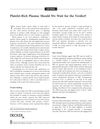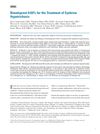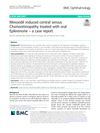 2 citations,
September 2015 in “Journal of the Egyptian Women's Dermatologic Society (Print)”
2 citations,
September 2015 in “Journal of the Egyptian Women's Dermatologic Society (Print)” People with psoriasis and depression have lower BDNF levels, which could help measure depression in those with psoriasis.
 1 citations,
July 2022 in “Functional foods in health and disease/Journal of functional foods in health & disease”
1 citations,
July 2022 in “Functional foods in health and disease/Journal of functional foods in health & disease” Taking a probiotic supplement twice a day improved hair growth, skin hydration, and metabolic health in adults at risk of metabolic syndrome.
 2 citations,
March 2004 in “Reviews in Gynaecological Practice”
2 citations,
March 2004 in “Reviews in Gynaecological Practice” Hormonal changes and psychological issues can cause sexual dysfunction in postmenopausal women. Behavioral therapy is recommended first, with hormone replacement helping some symptoms but not libido. Testosterone can improve libido, but its effects on overall sexual function are unclear. Emotional and relationship issues should be addressed before using medication, and the benefits and risks of testosterone supplementation should be considered.
 1 citations,
August 2020 in “Food Research”
1 citations,
August 2020 in “Food Research” Plant extracts like Avicennia marina, Boehmeria nipononivea, and Camellia sinensis could potentially treat hair loss with fewer side effects than synthetic drugs.
 June 2018 in “Journal of evolution of medical and dental sciences”
June 2018 in “Journal of evolution of medical and dental sciences” Skin problems like excessive hair growth, acne, and dark skin patches can be signs of Polycystic Ovarian Disease, which may also be linked to family history and a risk for diabetes.
 74 citations,
April 2005 in “Dermatologic Clinics”
74 citations,
April 2005 in “Dermatologic Clinics” Minoxidil and finasteride are effective for male hair loss, minoxidil for female hair loss, and various treatments like corticosteroids work for alopecia areata; treatment should be tailored to the individual.
 72 citations,
July 2014 in “American journal of clinical dermatology”
72 citations,
July 2014 in “American journal of clinical dermatology” Some treatments, like corticosteroids and sensitizing agents, can help with alopecia areata, but more high-quality research is needed.
 34 citations,
December 2012 in “Current Opinion in Clinical Nutrition and Metabolic Care”
34 citations,
December 2012 in “Current Opinion in Clinical Nutrition and Metabolic Care” Sex hormone treatments can increase muscle mass in older adults but have inconsistent effects on muscle function and may carry cardiovascular risks.
 20 citations,
December 2016 in “Neurodegenerative disease management”
20 citations,
December 2016 in “Neurodegenerative disease management” Teriflunomide effectively reduces relapses and disability in MS and has a manageable safety profile.
 13 citations,
October 1993 in “International Journal of Dermatology”
13 citations,
October 1993 in “International Journal of Dermatology” Minoxidil effectively promotes hair regrowth in younger patients with small balding areas.
 4 citations,
May 2014 in “Journal of Cutaneous Medicine and Surgery”
4 citations,
May 2014 in “Journal of Cutaneous Medicine and Surgery” Platelet-rich plasma may help with wound healing, hair growth, and skin rejuvenation, but more research is needed to prove its effectiveness.
 19 citations,
August 2010 in “Journal der Deutschen Dermatologischen Gesellschaft”
19 citations,
August 2010 in “Journal der Deutschen Dermatologischen Gesellschaft” Certain plant extracts can effectively treat skin conditions like athlete's foot, chronic vein problems, sun damage, skin growths, vitiligo, and hair loss, and may also improve skin appearance.
 7 citations,
April 2017 in “Dermatologic surgery”
7 citations,
April 2017 in “Dermatologic surgery” Hyaluronic acid fillers and combination treatments significantly improve facial defects from autoimmune diseases and are well-tolerated.
 7 citations,
November 2003 in “Current Opinion in Obstetrics & Gynecology”
7 citations,
November 2003 in “Current Opinion in Obstetrics & Gynecology” Metformin helps improve symptoms and reproductive outcomes in people with polycystic ovary syndrome.
 54 citations,
May 2018 in “Journal of The European Academy of Dermatology and Venereology”
54 citations,
May 2018 in “Journal of The European Academy of Dermatology and Venereology” Low level laser therapy works best for hair loss, followed by PRP, finasteride, and minoxidil.
 39 citations,
January 2019 in “Journal of Dermatological Treatment”
39 citations,
January 2019 in “Journal of Dermatological Treatment” Ketoconazole cream is effective for skin conditions like seborrheic dermatitis and may help with hair loss and other skin issues, with generally mild side effects.
 24 citations,
September 2001 in “Journal of The American Academy of Dermatology”
24 citations,
September 2001 in “Journal of The American Academy of Dermatology” Women's ovarian hormones and adrenal androgens change throughout life, affecting hair loss and health.
 19 citations,
November 2011
19 citations,
November 2011 Using systemic drugs as creams for skin conditions shows promise, but more research is needed to confirm their effectiveness and safety.
 15 citations,
April 2020 in “Journal of Dermatological Treatment”
15 citations,
April 2020 in “Journal of Dermatological Treatment” Minoxidil and finasteride work best for hair loss; more research needed.
 15 citations,
April 2011 in “Pediatric Nephrology”
15 citations,
April 2011 in “Pediatric Nephrology” New treatments for lupus show promise, but more research is needed, especially for children.
 4 citations,
June 2020 in “BMC Ophthalmology”
4 citations,
June 2020 in “BMC Ophthalmology” Minoxidil can cause a rare eye condition, but it was successfully treated with oral Eplerenone in one case.
 3 citations,
August 2021 in “Uro”
3 citations,
August 2021 in “Uro” Saw palmetto may improve urinary symptoms with fewer sexual side effects compared to some medications.
 223 citations,
December 2010 in “The Journal of Sexual Medicine”
223 citations,
December 2010 in “The Journal of Sexual Medicine” Some patients taking finasteride or dutasteride may have ongoing sexual problems and depression even after stopping the medication.
 30 citations,
October 2010 in “Journal of The American Academy of Dermatology”
30 citations,
October 2010 in “Journal of The American Academy of Dermatology” The conclusion suggests a possible link between iron levels and hair health in women, recommending further research on iron supplementation for hair loss.
 27 citations,
August 1999 in “Urology”
27 citations,
August 1999 in “Urology” Finasteride improves urinary function in men for 2 years.
 22 citations,
April 1998 in “Dermatologic Clinics”
22 citations,
April 1998 in “Dermatologic Clinics” Interferons are effective for some skin conditions and cancers, but can have side effects and need more research for optimal use.
 17 citations,
August 2015 in “Expert Opinion on Pharmacotherapy”
17 citations,
August 2015 in “Expert Opinion on Pharmacotherapy” The document concludes that oral finasteride and topical minoxidil are effective for genetic hair loss, while other treatments for different types of hair loss show promise but need more research.
 14 citations,
September 2019 in “Eye”
14 citations,
September 2019 in “Eye” Some oral medications may help treat central serous chorioretinopathy, especially eplerenone, but more research is needed.
 3 citations,
April 2015 in “American journal of biomedical sciences”
3 citations,
April 2015 in “American journal of biomedical sciences” Androgens play a key role in hair growth and disorders like baldness and excessive hairiness.
 August 2023 in “Vittalle”
August 2023 in “Vittalle” Mais estudos são necessários para garantir a eficácia e qualidade dos tratamentos de alopecia com plantas medicinais.






























